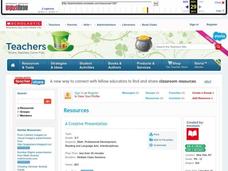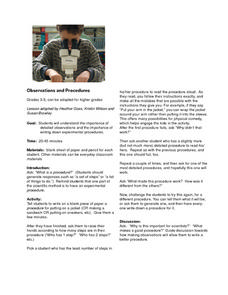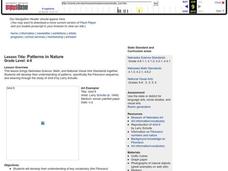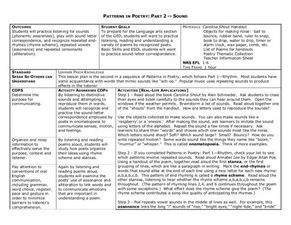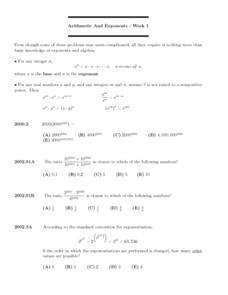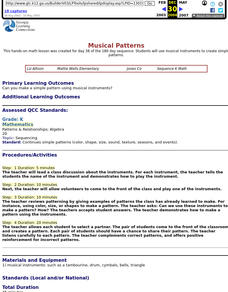Curated OER
Chain Together A Book Report
Individuals examine a book's components, including key events, characters, and vocabulary and develop "chain book reports" with their peers. Strips of paper containing the book's important events are staples together and hung.
Curated OER
Which Fish Where?
Here is a lesson outline that prompts elementary learners to graph and analyze data regarding fish caught along the Hudson River. They will review vocabulary and complete 2 worksheets which can be accessed by clicking on the provided links.
Curated OER
A Creative Presentation
Bring writing to life with this lesson in which elementary and middle schoolers create a display of the imagery they identify in a series of Gary Paulsen books. They read the suggested materials, identify imagery and descriptive...
Curated OER
Observations and Procedures
Young scientists critique the breakdown of detailed observations. They discover the importance of writing down experimental procedures. There are some guided discussion questions at the end of the resource.
Curated OER
Discussing Poetry In Class
Students investigate syllabic metre and rhyming techniques by analyzing poetry. In this language arts lesson, students read the poem Considering the Snail and discuss the nature and mood of the poem with their classmates. Students...
Curated OER
"Stomp"-Style Sequences
Young scholars develop patterns and combinations of movements into repeatable patterns. The video "Stomp Out Loud" with the percussive/dance group Stomp, is used to show students an example of the sequences they are going to create.
Curated OER
Patterns in Nature
Students learn about artist Larry Schulte and view examples of his work. They create addition sentence for the first seven numbers of the fibonacci sequence and use unifix cubes to build that sentences. Students color and create three...
Curated OER
Spiral Patterns in Art
In this art worksheet, students view a picture of Alexander Calder's sculpture "Black, White, and Ten Red." They analyze the sculpture by first finding the "rule" in the Fibonacci sequence. Students read a paragraph about where the...
Curated OER
Geometric Progressions
In this geometric progression worksheet, students examine a sequence and determine the next number. This one-page worksheet contains 15 problems.
Curated OER
Rocket Patterns
Students create their own paper rockets. They identify different patterns and practice making their own. They also discover the concept of sequences.
Curated OER
Worksheet 9 - Identifying the nth Term
In this sequencing worksheet, students identify the nth term in a sequence, determine the number of distinct rectangles found within vertical lines and identify distinct and non-distance parts of polygons made with overlapping lines. ...
Curated OER
S-I-R Model of Disease
In this SIR model worksheet, students use the SIR method to determine the rate of change of people real life problems. They investigate the sequence of people infected with a disease, the number recovered, and the number of susceptible...
Curated OER
Multivariable Calculus: Newton's Method
In this Newton's method instructional activity, students produce a sequence of approximations. They use Newton's method to approximate solutions. This two-page instructional activity contains explanations and examples. it contains two...
Curated OER
Analyzing the S-I-R Model
In this SIR model worksheet, students analyze a real life problem using the SIR method. They explore given facts and determine the threshold value for an epidemic, the sequence for the recovery period, and the effect on the model from a...
Curated OER
Patterns in Poetry: Part 2 -- Sound
Students understand a variety of poems listening for sound letter correspondence, rhyme scheme, assonance, and alliteration. In this language arts lesson, students practice listening and reading skills to complete patterns in poetry. ...
Curated OER
You Must Know These
In this sequence worksheet, students compute the value of the nth term. They identify a convergent series. This one-page worksheet contains four problems.
Curated OER
The Number Toolbox-Vocabulary Test
In this numbers vocabulary worksheet, students complete a 10 question test, matching "number" vocabulary terms with their correct definition. Answers are provided on page 2.
Curated OER
What Comes First?
In this numeral learning exercise, students identify counting numbers one through ten and place them in sequential order. There are ten problems listed on this learning exercise. Students demonstrate their knowledge to count from one...
Curated OER
Discussion Sheet 6: Convergence or Divergence
In this convergence or divergence worksheet, students perform tests for convergence or divergence. They estimate the sum in a series and determine the value of the convergent series. This one-page worksheet contains three problems.
Curated OER
Arithmetic and Exponents - Week 1
In this exponent worksheet, pupils add numbers written in exponential notation. They identify the base and the exponent. This two-page worksheet contains examples, definitions, and nine problems to solve.
Curated OER
Musical Patterns
Students use musical instruments to create simple patterns. They, in pairs, come to the front of the classroom and create a pattern.
Curated OER
Patterns and Matchsticks
In this math patterns learning exercise, students solve 10 problems in which a pattern is made with matchsticks on a grid. Students figure out how many matchsticks it will take to continue the pattern. Students also use simple algebra to...
University of Texas
Alphabetic Understanding, Phonics, and Spelling
Have your youngsters reading in no time with with collection of literacy activities and lessons. Starting with a basic understanding of the alphabet, this unit progressively builds students' phonemic awareness and ability to decode and...
101 Questions
Domino Skyscraper
Can a domino knock over a skyscraper? An inquiry-based lesson asks learners to calculate the size of domino needed to topple the Empire State Building. Using specific criteria and a geometric model, they find a solution.




